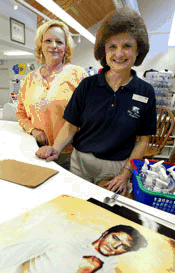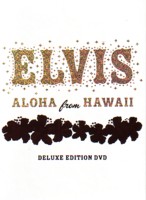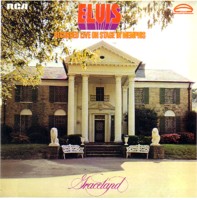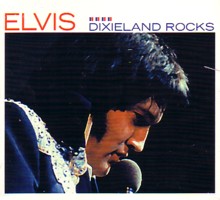Elvis
and the South: Love me tender The King was our prophet; our
states are Graceland on a grand scale
by
JOHN F. SUGG
We're
running from Ivan, chased by bruised skies and the staccato
thud of fat raindrops. Memphis looks awfully damn good as
a refuge. Divinity or chance (or, more likely, bad map-reading)
lands us on Elvis Presley Boulevard. Photographer Jim Stawniak
says, "Graceland." Graceland. Elvis. Sounds good. This is
a road trip about the South, after all.
| People,
their thoughts, icons, passions. What they revere, despise.
Their trajectory through the centuries and decades to
circa now. Elvis is as good a place to start as any. And
who knows? He may be the guiding muse on this trip. "Lead
me, Mr. Presley," I think. "Oh, he's around here all right,"
says a perfectly serious Regina Dorsey, late of Atlanta.
She's been pushed around the South by the economic winds,
finally landing "I'm not getting rich but it's interesting"
work at the cash register of the Chrome Grille at Graceland.
"No one is in the kitchen, and all of sudden, the water
tap turns on. Or the stove. Things aren't where we leave
them. It happens all the time. He's here." |
 |
"POVERTY
TO RICHES," says Judy Schumpert, who, along with Rhonda Lamp,
runs the Elvis gift shop in Tupelo (above).
For
all of the glamour that was Elvis, the Memphis street that
totes his name is hardly a fitting tribute. Empty used car
dealerships with crooked signs, a string of seedy hotels all
trying to leech a bit of Elvis into their names. Storefront
after storefront with broken windows like skulls' vacant eye
sockets. Graceland.
This
is America's shrine to the common people. Folks cry at the
graves of Elvis and his kin; they reverently touch his images.
Some write their names on the bricks that anchor Graceland's
iron gates, hoping the Saint in Gold Lame will notice.
We
scurry southeast to Tupelo, Miss. The shotgun shack where
Elvis Aaron Presley entered this astral plane is nicely preserved,
a Medina to the Mecca in Memphis. Recalling a model I'd spied
at Graceland, I notice there's one thing missing -- the outhouse.
That's the South. We brag about our heritage but don't want
people to see the crap.
For
a minute, I'm so focused on trying to absorb Elvis' starting
point, I miss what surrounds the holy ground. They've Disney-ized
his birthplace. No tasteful sanctuary where pilgrims can light
rock 'n' roll votive candles. The outdoor commode has transformed
into a grandly tacky souvenir shop. Seven bucks to look at
trinkets from Elvis' early years.
Thirty
more for a life-size cardboard cutout of the King. Don't be
cynical. Maybe all this is fitting. I think about Graceland
again as I hang out in Tupelo, sizing up the hurricane's latest
frenzied wobble to the east, no west, no east again. Ivan
must have watched old Elvis flicks.
Elvis
is the South's story. Humble origins, truck driving aspirations.
Hugging that old-time religion so hard his arms must have
ached. "He loved his origins, was always loyal," smiles Scarlett
Sullivan, who, with husband Mike, have fled their Mobile,
Ala., home. Like scores of others, they measure their retreat
from Ivan by stops at, as she says, "the places I've always
wanted to visit most."
Like
the South, Elvis needed cultivation to blossom. Enter a consummate
hustler, ex-Tampa dog catcher Col. Tom Parker, who channeled
Elvis' explosive, unsophisticated energy -- much as like beloved
demagogues, from Huey Long to George Wallace to Strom Thurmond.
The wealth rolled in. Elvis shot up as more than a star --
the first salvo in the youth revolution. The New South's cheap
land and cheap labor created an energy burst with shock waves
as seismic, if not as melodic, as Elvis'. Graceland was Elvis'
statement to the world on his roots.
The
mansion's decor is crass. Puke green shag carpets, a "Jungle
Room" and a "TV Room" that assault the senses. It's a lot
like our gleaming cities. A lot of money went into fixing
things up, but the impact is nauseating. There's another part
of Graceland, a small meadow where he kept horses. It's less
pretentious, it has charm. That, too, is what the South is
about. Small towns, loyalty, tightly woven lives, people with
deep roots in the land. "Elvis was America's dream," beams
a pouffy-hairdooed Judy Schumpert, who runs the gift shop
at Elvis' Tupelo birthplace. "He was all about poverty to
riches and fame. He stayed the same person, he really did,
and he never forgot where he came from."
Senior
Editor John Sugg and photographer Jim Stawniak are somewhere
in Dixie -- we're not sure quite where.
(Spotlight/Article,
Source: Creative Loafing, 23 Sep 2004)
|







